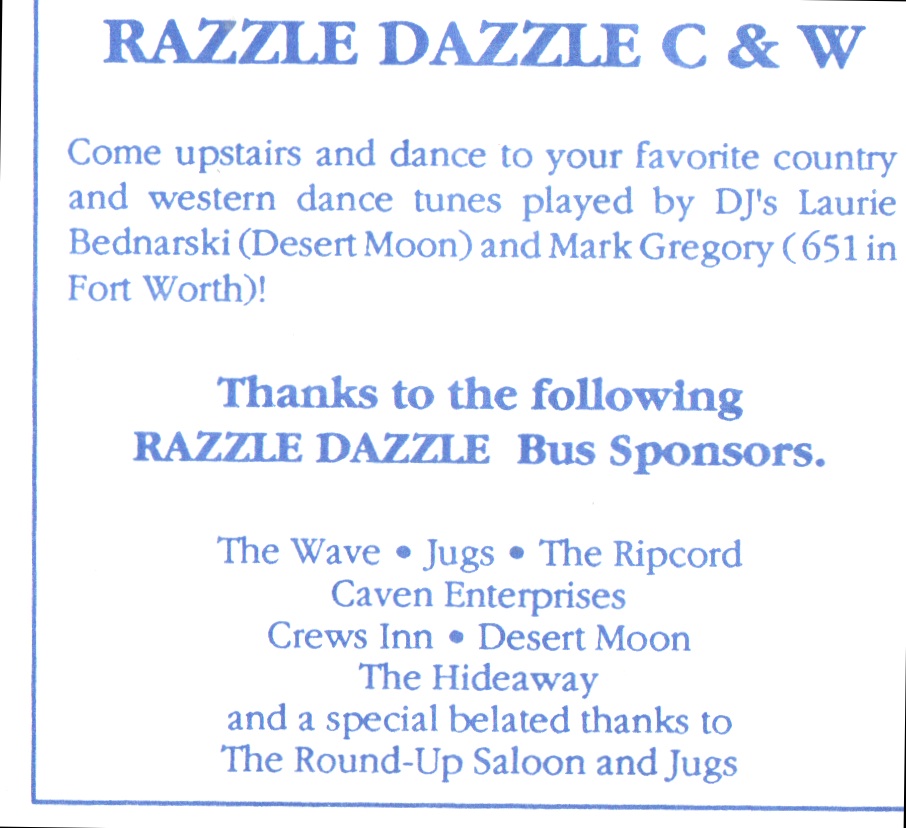 |
| Dallas 1960s |
The Conference Room
Location: Dallas, Texas, USA
Opened/Closed: 1960s, 1970s
Although "interesting" and "masters thesis" would seem to be a contradiction in terms, this thesis by Karen S. Wisely called "The 'Dallas Way' in the Gayborhood" has some pretty fascinating material.
For our purposes though, I'm going to limit our discussion to a lesbian bar called The Conference Room and the gender segregation/control of space within the so-called LGBT community.
Here's what she says about The Conference Room:
While bars that catered to primarily homosexual patrons were able to exist in Dallas at that time [i.e. the early 1960s], one should not assume that such a practice was widely accepted. Police raids occurred regularly in the Dallas bars, just like in other cities, and the bars dealt with the inevitability of those events. For example, the door person for The Conference Room, a lesbian bar where businesswomen met after work, turned on a red light whenever she saw police or just someone who looked out of place near the bar. When that happened, the patrons inside would stop dancing, move away from each other and the underage crowd would sneak out a bathroom window. Another method of police harassment in gay bars was for the vice squad to conduct sting operations; however, those were more common in the men's bars.
Other lesbian bars that had the flashing red light thing include the Sea Colony in New York and the Canyon Club in Los Angeles.
Wisely also tells us that the gay bars in Dallas were patronized by both gay men and lesbians till the 1970s--though, admittedly, the bars were dominated by gay men. But then the bars became increasingly segregated by sex.
 |
Conference of Secretaries in
Dallas, Texas (June 1959) -
No pants then either |
 |
Throckmorton Mining Company - a gay male bar
now closed |
When a bar decided that it wanted to focus on serving one particular gender (usually men), it most often issued a restrictive dress policy. In 1979, for example, several bars including the Old Plantation, Throckmorton Mining Company and Magnolia's, prohibited admission to women wearing jeans. This policy was not only discriminatory against all women, but was obviously focused on lesbians - and butch lesbians in particular - who were much more likely than heterosexual women to go out attired in jeans. Dress codes, when applied equally to all customers, were legal and perfectly reasonable; however, the same bars that refused jeans-wearing women allowed men clad in blue jeans with no difficulty whatsoever.
It was also common for sex (and race) segregation to be maintained by demanding extra identification from those deemed undesirable by the bar management.
Wisely's source for this information is largely drawn from her interview with Karen Jack, who has an extensive history working in gay and lesbian bars in Dallas. Jack also experienced anti-lesbian employment policies at the largely male clubs, which were dominated by a single conglomerate.
Kathy Jack, proprietor of Jack's Backyard in Oak Cliff and for the first sixteen years of its existence the manager of Sue Ellen's [a lesbian bar] in Dallas, has worked in gay bars since the early 1980s. She managed a lesbian bar called The Unicorn very successfully for four years. Yet, when The Unicorn closed and she needed a job, she encountered difficulties because she was female. Caven Enterprises, who owned four gay bars, the Old Plantation, Throckmorton Mining Company, J.R.'s and 4001, did not want to hire her. Finally, the general manager took a chance and hired her as a door person for the Old Plantation. Two months later, she was a manager there. Even then, she recalled that on her first day as manager, the staff, made up entirely of men except for a single female bartender, called her "dyke" under their breath every time she walked past. She won them over eventually, but at first, the work environment was somewhat hostile.
Caven Enterprises, Dallas' largest owner of gay bars and clubs, formed in 1969 and has operated numerous nightclubs in the area since then, opened their first lesbian bar, Sue Ellen's, only in January of 1989 after years of lobbying by Kathy Jack. In spite of the many lesbian-focused bars that have thrived over the years in Dallas, no one at Caven thought such a place could succeed. When the Old Plantation changed into the Village Station and began to stay open until four in the morning on weekends for after-hours dancing, a large contingency of lesbians showed up from other bars. Jack never gave up and continued to suggest a women's bar to her bosses at every opportunity. Finally, they relented but delayed more than another whole year before Sue Ellen's opened. Thanks in part to the work of Kathy Jack and others like her, Sue Ellen's thrived and Caven Enterprises' employment practices changed considerably.
Maybe Wisely finds this an inspiring story; I find it maddening. The fact that lesbians spend years groveling before men (gay or straight), begging them to open a facility that will ultimately make money for them off of women--well, that just shows that it isn't just a few insensitive or "sexist" beliefs that need to be changed. It's a whole money/power structure dominated by men.
Follow ups on the some of the other places mentioned:
Other than this reference to the Unicorn, which shows that it was open at least as early as 1984, I haven't found much more about it.
Sue Ellen's is still in business, though it moved to a new location in May 2008.
Jack's Backyard opened on October 31, 2008 and closed on June 26, 2011. We'll have to look at this place in more detail another time.





























